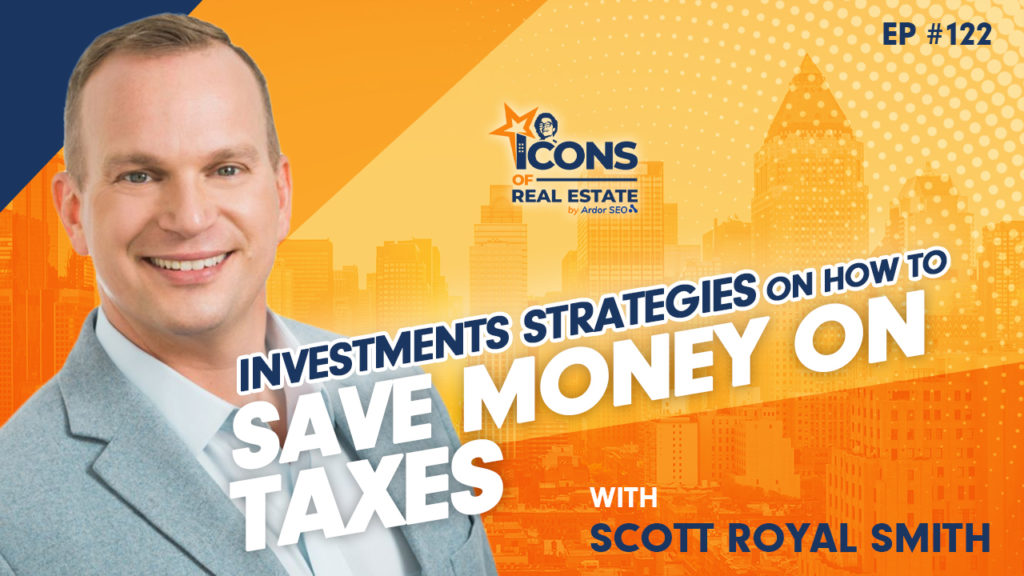Taxes are one part of real estate investment operational costs. Although they shouldn't drive your investment decision, you need to thoughtfully evaluate your preferred asset classes and accounts to lower your tax bill. Read on to discover helpful investment strategies to save money on taxes.

While tax rates and rules might change over time, nothing beats the value you'll get from factoring in taxes while making investment decisions.
Taxes can reduce your return on investment yearly, potentially affecting your long-term goals. Before deciding on whether to go for real estate investment, cash instruments, bonds, or stock, it's best to understand how the Internal Revenue Service (IRS) treats income from such asset classes.
You can also gain valuable insights from investment experts like Scott Royal Smith by listening to this Icons of Real Estate Podcast episode, where he gives out vital tips for lowering investment property tax returns.
Scott Royal Smith is an astute real estate investor and founder of The Royal Legal Solutions, where he offers asset protection services to real estate investors.
If you're an investor looking to protect yourself against paying high taxes on your investment return, this article explores vital investment strategies you can adopt. Read to the end!
The IRS taxes investment income separately from the way working wages are taxed. These differences include the tax rates and how and when investment income taxes are assessed.
Broadly speaking, investment income comes in the following two ways, with each treated differently for tax purposes.
Refer to the increment in an asset price. For instance, if a real estate property or stock goes up in value, the extra amount is the capital gain.
The government taxes capital gains when the asset has been sold.
Cash income or dividends is money you receive during the year. This cash is often subject to taxes for the year it was received.

Now that you know how the IRS taxes investment income, the following are investment strategies you can adopt to lower your taxes:
Investment is a crucial wealth-generation tool, with the investor benefiting from favorable tax treatments for long-term capital gains.
If you hold a capital asset for longer than a year, you'll enjoy a preferential tax rate depending on your income level. It could be 0%, 15%, or even 20% of the capital gain.
Alternatively, the IRS will tax your capital gain at ordinary income rates if you hold the asset for less than a year before disposing of it. Therefore, it's best to understand short-term vs. long-term capital gains before starting your investment journey.
Employees can enjoy reduced taxes from contributions up to $19,500 in a 403(b) plan and $20,500 in a 401(k) plan. Also, workers up to 50 years and more can add $6,500 to their retirement plan contribution.
Alternatively, employees without a workplace retirement plan can contribute up to $6,000 or $7,000 for people above 50 in their traditional individual retirement account (IRA) and enjoy a tax break.
Taxpayers with workplace retirement plans can deduct all of their traditional IRA contributions, depending on their income.
Check the IRS rules for how much to deduct and if you're qualified for such deductions.

Consider using your health savings account to reduce taxes if you have a high-deductible health insurance plan. If you're lucky, your employer might match your health savings account (HSA) as with a 401(k).
This contribution by payroll deduction is exempted from your taxable income and is completely tax-deductible from your income. Presently, the maximum deductible contribution for individuals is $3,650, while for families, it's $7,300.
These funds can grow without you paying taxes on the earnings. Your withdrawals won't be taxed if you use your HSA to pay some medical expenses.
The IRS fixes the wage and investment income differently, as reflected in the IRS capital gains treatment. Depending on your income level, the IRS taxes capital gains at 20%, 15%, and even 0%. However, you have to play by the rules.
These taxes are often lower than short-term capital gains, taxed at the ordinary income rate. If you're a buy-and-hold investor and hold your investment for over a year, you can take advantage of lower long-term rates.
For instance, if you earn less than $80,800 as a couple or $40,400 as an individual filer, you can be exempted from qualified dividends or capital gains up to a specific threshold.
If you gain too much ordinary income, you'll be ineligible to qualify for the 0% rate and have to pay a higher investment tax.
More so, if your income is less than average in a tax year, you can gain a 0% investment tax rate and increase your investment cost without any tax hit.
Entails using your investment losses to offset the gains yearly, helping to reduce your income tax liability at the federal level.
If your investment losses are more than the gain, you can use tax loss harvesting to offset about $3,000 of the annual federal taxable income. You can also carry additional losses over to future tax years.
Tax loss harvesting can be valuable for high-earning investors with a long-term higher capital gain tax and a potential 3.8% additional net income tax. Note that if you hold off selling your asset till later in the year, the prices will depend on the year's final weeks of market downturns.
Identical stocks bought within 30 days after or before the sale will also be regarded as a wash sale, which may render it ineligible for tax loss harvesting for that tax year.
Consider consulting a tax advisor to understand how the wash sale rules work and if it prevents you from using the tax loss harvesting strategy.

Real estate investors looking to sell a property that isn't their primary residence can take advantage of the 1031 exchange and reinvest the money into another building.
1031 works by allowing you to sell your property, defer your capital gains, and invest the money into another like-kind investment property quickly. However, 1031 exchanges come with specific rules.
These rules can be complex, but you must follow them strictly to avoid losing your tax deferral. Like other asset types, you can hold your investment long-term and defer capital gains for up to decades.
Most importantly, you get to avoid high real estate commissions.
Generally, cash distributions and dividends are taxable in the year they're received. Therefore, if you use a taxable account, you can't avoid paying taxes as with capital gains.
Getting low dividend taxes depends on where you keep your assets. For instance, you can opt for a tax-advantaged account, like a standard taxable brokerage account or an IRA.
For investors with dividend stock, it's best to keep them within the tax-free confines of an IRA to avoid taxes on the distributions. Alternatively, you can hold stocks with possible capital gains in a regular taxable account.
You can enjoy IRA's key benefits (tax deferral) in a taxable account until you're ready to sell your investment. However, consider whether packing your whole dividend payers into the IRA is the best financial decision.
Although paying taxes to the authorities is crucial, you don't have to pay more than is necessary. Taking your time to peruse the IRS website and other reputable financial information sites might lead to tax savings up to hundreds or even thousands of dollars.

Don't forget to get resources from successful investors. To gain more insight, you can listen to renowned serial real estate investors like Scott Royal Smith talk about asset protection and how to lower investment taxes on the Icons of Real Estate podcast.
Whatever investment strategies you adopt, remember the goal is to make tax-efficient decisions. Also, consider how the investments will diversify your portfolio while pursuing your overall investment goals at your preferred risk tolerance level.
Don't forget to consult a professional tax advisor before making investment decisions to avoid incurring more taxes instead of lowering them.
However, if the technicalities involved in active real estate investing are too much for you, real estate companies like Holdfolio offer you the chance to become a passive real estate investor and earn returns without doing any work.
This article is sponsored by ArdorSEO, the leading online management company offering local real estate SEO services to help real estate agencies reach more prospective customers online.
If you're tired of paying more taxes on your investment, you need to learn how to lower investment taxes through seasoned experts like Scott Royal Smith. Catch him speaking about how to reduce investment taxes at the Icons of Real Estate podcast and learn how to become a successful real estate investor like him.

Scott Royal Smith is an asset protection attorney and long-time real estate investor. He's on a mission to help fellow investors free their time, protect their assets, and create lasting wealth.

Ready to know more than your attorney? Join our community platform where you'll get immediate FREE access to all our best educational resources for real estate investors. Including 8 Masterclasses, group mentoring replays, and much, much more.
Join thousands of real estate investors in all 50 states as they enjoy exclusive content, special promotions, and behind-the-scenes access to me and my guests. No spam, ever. Just great stuff!
